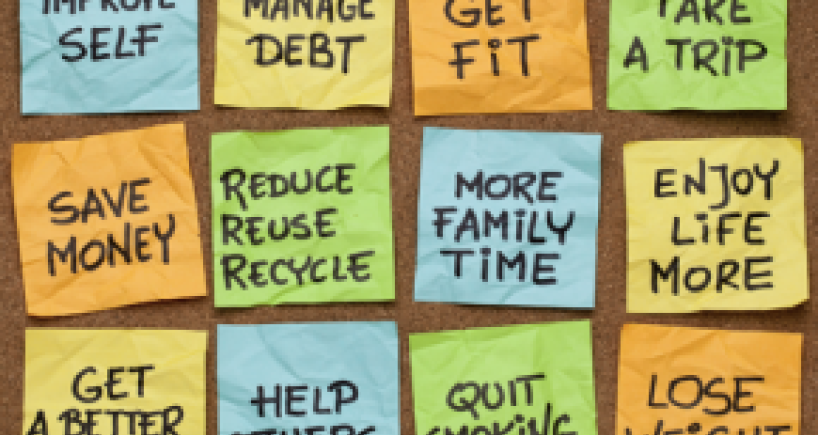
Mental Health and Behavioural Sciences
Being Resolute About Your Resolutions
Being Resolute About Your Resolutions Dec 30, 2013
 Welcome to the New Year! And an even bigger welcome to all the resolutions you have been planning. Right from giving up things to doing things, from sleeping on time to waking up on time, integrating exercise and cutting on junk food to being nice to people and containing your anger, resolutions of all sort must be going through your mind and it may be getting difficult to figure out which one to pick and which one to stick to.
New Year resolutions have been prevalent since time immemorial and their uniqueness is exemplified by the regularity with which we make them and then we are not able to keep them. All of us get tempted to make a resolve which is based on the assumption that regardless of the fact that we have not been able to take care of that aspect for so long, suddenly overnight things would undergo a change and we would be able to switch from one mode of functioning to another.
The problem is that these resolutions which are geared towards improving the self and self-esteem in fact, eventually, can make us feel horribly negative towards our own self. We can attribute characteristics like being lazy or weak or someone who is incapable of changing to our own self can be a significant problem to how we view our self.
Why Resolutions?
It is difficult to understand that why is it that we all make resolutions each year. Who and what makes us take this decision frequently evades us. It is in fact almost a tradition which has been passed on from generation across the years. And if we try to understand what reasons could be there for its existence then probably self-improvement seems the most plausible one.
The whole idea is that annually one should review what one did and how one did it and determine if there are areas in which one needs to bring about changes, even if they may seem frivolous, to ensure that one is continuously in a process of working upon the self. But again, the idea is to be able to make the change one needs to feel good.
How to Make Them Work?
Studies have shown that of all the people who make resolutions, approximately 88% tend to fail in keeping them (Wiseman, 2007). This, obviously, is a very large number and easily goes to show that somewhere we do go wrong in determining the best ways to make and keep resolutions. The reason is not that we just can’t keep resolutions or that there is some significant deficit in our personalities or temperament that interferes with our ability to do so.
Probably the biggest error we make is that we do not look at or evaluate our goals and frequently the choices we make for our resolutions end up being discordant with what our goals are, making them difficult to achieve or stick by. At the same time, we many-a-times go overboard with the number of resolves we make. So the key is to make few yet significant resolutions which tend to be in line with what one’s goals are.
Make sure that these make logical sense and are not too vague but are rather specific in terms of the expectations they lay on one’s self. Being concrete in terms of what exactly one needs to do in order to achieve the resolution is a must. There needs to be a sense of planning around how one would go about doing the things one needs to in order to make sure one can stick to the resolution. And most importantly make sure you take the help of your social support system, that is, your friends and family to achieve the resolutions you have set for yourself.
So be short, be crisp, and be decisive and smart. Don’t go overboard with what you think you should achieve, but realistically set goals for yourself. And most importantly remember you can make mistakes and errors so don’t be too harsh on yourself if in case you err on an occasion.
Welcome to the New Year! And an even bigger welcome to all the resolutions you have been planning. Right from giving up things to doing things, from sleeping on time to waking up on time, integrating exercise and cutting on junk food to being nice to people and containing your anger, resolutions of all sort must be going through your mind and it may be getting difficult to figure out which one to pick and which one to stick to.
New Year resolutions have been prevalent since time immemorial and their uniqueness is exemplified by the regularity with which we make them and then we are not able to keep them. All of us get tempted to make a resolve which is based on the assumption that regardless of the fact that we have not been able to take care of that aspect for so long, suddenly overnight things would undergo a change and we would be able to switch from one mode of functioning to another.
The problem is that these resolutions which are geared towards improving the self and self-esteem in fact, eventually, can make us feel horribly negative towards our own self. We can attribute characteristics like being lazy or weak or someone who is incapable of changing to our own self can be a significant problem to how we view our self.
Why Resolutions?
It is difficult to understand that why is it that we all make resolutions each year. Who and what makes us take this decision frequently evades us. It is in fact almost a tradition which has been passed on from generation across the years. And if we try to understand what reasons could be there for its existence then probably self-improvement seems the most plausible one.
The whole idea is that annually one should review what one did and how one did it and determine if there are areas in which one needs to bring about changes, even if they may seem frivolous, to ensure that one is continuously in a process of working upon the self. But again, the idea is to be able to make the change one needs to feel good.
How to Make Them Work?
Studies have shown that of all the people who make resolutions, approximately 88% tend to fail in keeping them (Wiseman, 2007). This, obviously, is a very large number and easily goes to show that somewhere we do go wrong in determining the best ways to make and keep resolutions. The reason is not that we just can’t keep resolutions or that there is some significant deficit in our personalities or temperament that interferes with our ability to do so.
Probably the biggest error we make is that we do not look at or evaluate our goals and frequently the choices we make for our resolutions end up being discordant with what our goals are, making them difficult to achieve or stick by. At the same time, we many-a-times go overboard with the number of resolves we make. So the key is to make few yet significant resolutions which tend to be in line with what one’s goals are.
Make sure that these make logical sense and are not too vague but are rather specific in terms of the expectations they lay on one’s self. Being concrete in terms of what exactly one needs to do in order to achieve the resolution is a must. There needs to be a sense of planning around how one would go about doing the things one needs to in order to make sure one can stick to the resolution. And most importantly make sure you take the help of your social support system, that is, your friends and family to achieve the resolutions you have set for yourself.
So be short, be crisp, and be decisive and smart. Don’t go overboard with what you think you should achieve, but realistically set goals for yourself. And most importantly remember you can make mistakes and errors so don’t be too harsh on yourself if in case you err on an occasion. 


















